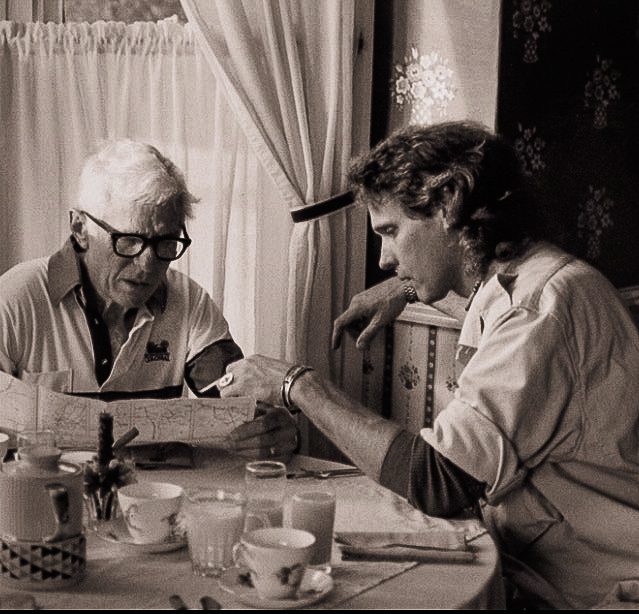Talk Less, Say More
[ theme music rises ]
It’s been said that better questions lead us naturally to better answers, and that it’s in not knowing that we open the doorway to knowing. I’m Scott Lennox and you’re listening to The Beautiful Question, a consideration of things that truly matter in a complex world.
[ brief pause ]
I open and close each week’s podcast by inviting our consideration of “things that truly matter in a complex world,” as you just heard. One of those repeating considerations is the power of mindful silence and the things that grow out of it.
Join me this week as we consider the value of measuring the things we say and the things we don’t say. Stay with me.
[ brief pause as theme music fades ]
When I was a boy, the depth of my father’s silences were unnerving. I remember times when he was driving our family across the country or when he and I were alone and he might not say anything for more than an hour. Feeling nervous and wanting so much to connect with him, I filled the air with words. More often than not, he took it all in and said very little, if anything at all.
It would be decades before I really grasped the importance of “talking less to say more.”
Since those early days with my dad, I’ve spent time on ranches and farms, working beside men or women who might not speak two dozen words from before sunup ‘til after sundown. When they did, each carefully chosen word mattered. Listening to folks like that, I learned that like my father, these were people of substance, people who knew themselves well, who were intentional about the things they thought and said, and who were quite happy to be in their own company without noise or needless chatter.

Photo: Scott Lennox
It was with the greatest joy that I finally learned how to be in shared stillness with my father. Listening deeply to the things he chose to tell me, I became more mindful of my own words, weighing them in my mind before I spoke them. Like it was yesterday, I remember a particular morning in the summer of nineteen eighty-eight. Sitting in the corner of the small restaurant of a Nova Scotia hotel, we looked at the map and planned our route for the day and the things he wanted to show me about his childhood home.
Out of that conversation, we developed a quiet bond that continued to strengthen as long as he was alive. To this day, I’m proud to carry with me the things I can of his clarity of mind and voice.
[ brief pause ]
Behind intentional brevity, there are doses of deep thought and mindfulness and slowing ourselves down. I think of the remark attributed to the French philosopher and mathematician, Blaise Pascal, in which he apologized to someone for having written a long letter.
“I didn’t have time to write a short one,” he concluded.
Sometimes I compare that kind of verbal brevity to creating a flavorful reduction stock in my kitchen. The more it’s cooked down and wine is added to it and then cooked down again, the richer the sauce becomes. One small sip and your mouth explodes with flavors so beautiful you can scarcely describe them.
Conversation can be like that.
Like that delicious stock, mindful communication requires presence and taking all the time we need for thoughtful consideration. That slowing down is something that has grown rare in today’s culture of sound bites and haste.
But what’s the hurry, really?
[ brief pause ]
Can you think of times you’ve said something only to realize later that you didn’t speak to the heart of what you wanted to communicate? When I do that, I have to stop and ask myself what imperative I was imposing on myself to speak without really thinking about it. Was I feeling a need to be competitive? Was I afraid of how I would be seen? Was I hurrying without even knowing why? Was there really anything wrong with closing my eyes and thinking it through for a few more seconds?
That brings us to this week’s Beautiful Questions.
[ brief pause ]
Question One: How much time are you willing to allow yourself to listen to your own thoughts before you speak?
Question Two: What happens when you are more intentional about your words and your silences?
Question Three: How would you communicate if your words came out of stillness and not out of a sense of urgency?
As you sit with these considerations, I’ll be happy to hear from you. Write and tell me about them.
[ brief pause ]
As I say each week,
My Light with Your Light!
[ theme music & sign-off ]
Thank you for joining me in these podcasts as we keep doing the things we can to respond to life in increasingly effective ways. As always, I’m open to your comments and feedback.
You can be further inspired by visiting my friends at Kosmos Journal. That’s K O S M O S Journal. Their mission is to inform, inspire, and engage global transformation in harmony with all life. You can easily find them online at Kosmos Journal dot O R G.
And at thebeautifulquestion.com, you can read the illustrated transcript of each podcast as you listen. You’ll also find an archive of all previous podcasts, including episodes three and four, guided relaxation audios that can help you practice letting go on a daily basis.
If you find these podcasts useful, don’t hesitate to share them or tell others about them. That’s a great way of helping me get a voice of calm and collaboration and balance and encouragement out into the world.
[ brief pause ]
I’m Scott Lennox, and this has been The Beautiful Question.
[ brief pause ]
The Beautiful Question is a One Light production, written, produced, and engineered by Scott Lennox at HeartRock Studios in Fort Worth, Texas, as a way of paying forward to life, being fully present, becoming better engaged with things that truly matter in a complex world, and committing to a healthier future for all of us.
